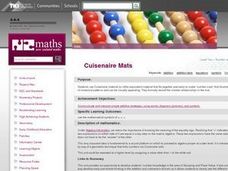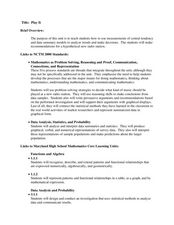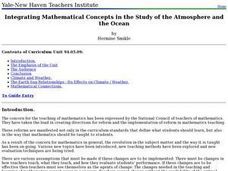Curated OER
The Business of Credit
Learn about credit ratings and how it plays a role in the function of small businesses. Learners use their knowledge of good and bad credit to role play and determine good credit vs. bad credit in the area of small businesses.
Curated OER
Cuisenaire Mats
First graders use Cuisenaire rods to study the mathematical symbols =, <, > for the relationships is equal to, is less than, and is greater than. They use the rods to show visual explanations of common number combinations.
Curated OER
Castles On The Ground (2D & 3D Shapes)
Explore the relationship between 2D and 3D shapes by having your class view representation of shapes and investigate their symmetry. They will create a solid object from diagrams and describe the reflection or rotational symmetry. In the...
Curated OER
Prime and Composite Numbers - Kenwood Academy
Learners investigate prime and composite numbers. They use a number chart and cross out multiples of 2,3,5 etc. up to 100. Pupils fold pieces of masking tape around pennies and label them with composite numbers, then fold masking tape...
Curated OER
It's About Time
First, second, and third graders explore elapsed time through estimation and prediction. They work with a partner to estimate how long it will take to perform various tasks. One person uses a stop watch to time his or her partner...
Curated OER
Symmetry with Shapes
Students analyze a symmetrical stamp design with an equal balance of light and dark to create a pattern in succession. In this shape design lesson, students review concepts of sign, symbol and language across cultures. Students analyze...
Curated OER
Play It
There are a number of activities here that look at representing data in different ways. One activity, has young data analysts conduct a class survey regarding a new radio station, summarize a data set, and use central tendencies to...
Curated OER
Counting Back and Counting On
Read aloud your choice of books about counting on and counting back (a list is provided, or tell stories of your own). Your learners will write horizontal equations to portray what happens in the story. They build a paper chain and...
National Council of Teachers of Mathematics
The Roll Out Fractions Game: Comparing Fractions
Reinforce the concept of comparing fractions with a hands-on, two-player game that calls for a visual model, score board, and dice. Players roll dice to acquire their given fraction, create the fraction using fraction tiles, then compare...
Curated OER
Number in Geometry
Students use a number line to assist with their additions. They use a calculator to check for factors. Students are taught factors and multiples. They use array model of multiplication to define meaning. Students develop a wide range of...
Curated OER
Problem Solving
Eighth graders complete Calculator Explorations, Problem -solving, and the Discussion topic as outlined in the worksheet from Lola May's Teaching Math - Extending the meaning of multiplication and division.
Curated OER
Integrating Mathematical Concepts in the Study of the Atmosphere and the Ocean
Students utilize problem solving strategies that emphasis writing in mathematics, and strategies that have students make decisions and draw conclusions. They connect math to weather and climate topics.
Curated OER
Sharing More Lollies
Students examine the math problem, think about it and discuss with their classmates. They work on the rest of the problems in pairs using problem solving strategies and fractions.
Curated OER
Discovery
Students explore patterns in number problems. They devise a strategy to solve a number problem. Students estimate and calculate answers, making efficient use of a calculator, where appropriate, as part of solving a problem. They...
Curated OER
Noughts
Students try to figure out the strategies to the game Noughts. Students logic must play a part in the process of the game. Students apply the symmetries of regular polygons. Students devise ways to critically follow a chain of reasoning.
Curated OER
Can You Guess
Learners develop useful strategies for mental calculation when estimating possible addition solutions. They mentally perform calculations involving addition and subtraction. Students state the estimated sum or difference between numbers.
Curated OER
Coin Exchange
Second graders explore the concept of money and simple arithmetic. They represent a sum of money using various combinations of coins and devise and use problem solving strategies to explore mathematical situations.
Curated OER
A Square of Circles
Second graders practice calculations and working with even and odd numbers. They perform mental calculations involving addition. Students devise and use problem solving strategies to solve problems.
Curated OER
Pigs and Ducks
Second graders use multiplication to solve problems. They use the multiplication facts for 2 and 4. Students combine operations to solve the problem and they devise and apply problem solving strategies.
Curated OER
How Many Strips?
Second graders investigate the measurement of 1 meter. They predict and measure how many strips of paper it takes to make exactly one meter. Students devise and use problem solving strategies to solve the problem.
Curated OER
Measurement
Students use arithmetic in a practical situation using time and distance.
As the calculations involved in this problem involve single digit addition and multiplication it offers a good opportunity to encourage the students's use of...
Curated OER
Parking Meters
Third graders are introduced to the problem with a short discussion about parking. They then solve with a partner. As they work ask questions that focus on the strategies they are using to make the calculations.
Curated OER
Adam's Watch
Third graders use their watches to tell the time while the teacher lists their responses on the board along with the reasons for them (set incorrectly, gain/lose time). They solve the problem in pairs and focus their thinking on the...
Curated OER
Little Pigs with Big Problems
First graders solve one problem per day regarding the story of Three Little Pigs. In this math journals instructional activity, 1st graders solve problems on a daily basis using the story of the Three Little Pigs.

























